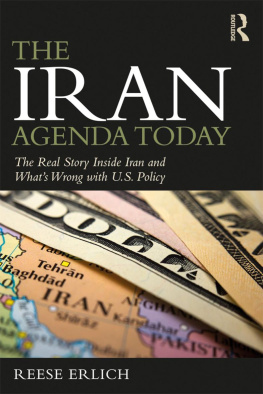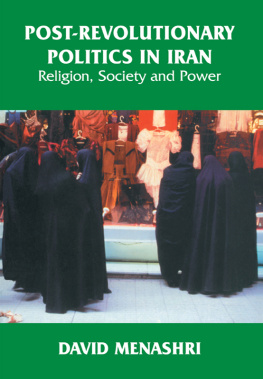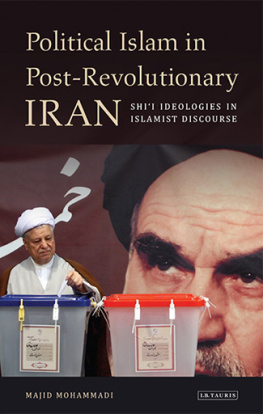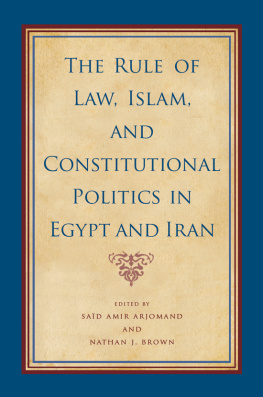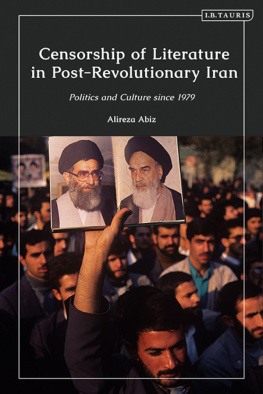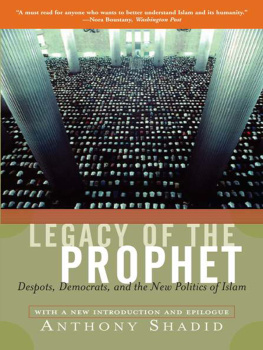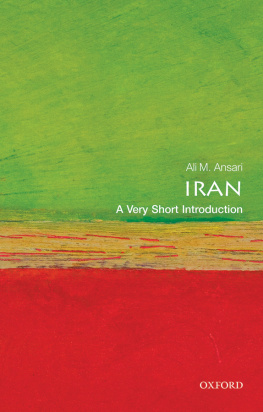Roy Mottahedeh - The Mantle of the Prophet: Religion and Politics in Iran
Here you can read online Roy Mottahedeh - The Mantle of the Prophet: Religion and Politics in Iran full text of the book (entire story) in english for free. Download pdf and epub, get meaning, cover and reviews about this ebook. year: 2014, publisher: One World (UK), genre: Detective and thriller. Description of the work, (preface) as well as reviews are available. Best literature library LitArk.com created for fans of good reading and offers a wide selection of genres:
Romance novel
Science fiction
Adventure
Detective
Science
History
Home and family
Prose
Art
Politics
Computer
Non-fiction
Religion
Business
Children
Humor
Choose a favorite category and find really read worthwhile books. Enjoy immersion in the world of imagination, feel the emotions of the characters or learn something new for yourself, make an fascinating discovery.

- Book:The Mantle of the Prophet: Religion and Politics in Iran
- Author:
- Publisher:One World (UK)
- Genre:
- Year:2014
- Rating:4 / 5
- Favourites:Add to favourites
- Your mark:
- 80
- 1
- 2
- 3
- 4
- 5
The Mantle of the Prophet: Religion and Politics in Iran: summary, description and annotation
We offer to read an annotation, description, summary or preface (depends on what the author of the book "The Mantle of the Prophet: Religion and Politics in Iran" wrote himself). If you haven't found the necessary information about the book — write in the comments, we will try to find it.
The Mantle of the Prophet: Religion and Politics in Iran — read online for free the complete book (whole text) full work
Below is the text of the book, divided by pages. System saving the place of the last page read, allows you to conveniently read the book "The Mantle of the Prophet: Religion and Politics in Iran" online for free, without having to search again every time where you left off. Put a bookmark, and you can go to the page where you finished reading at any time.
Font size:
Interval:
Bookmark:
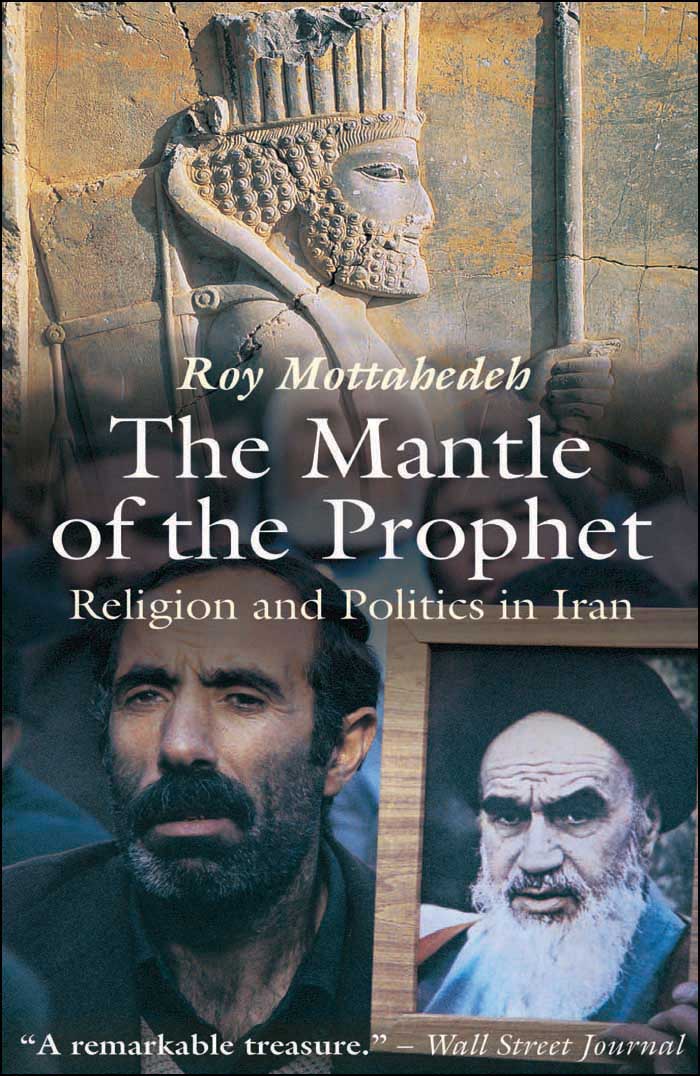
PRAISE FOR THE MANTLE OF THE PROPHET:
Chosen by Foreign Affairs magazine as one of the top 75 books of the twentieth century.
The beauty of [Mottahedehs] book is in his ability to explain sophisticated ideas and difficult subjects in a way which is widely accessible an extraordinary book.
London Review of Books
A remarkable treasure.
Wall Street Journal
A skilfully crafted and well-written book Mottahedeh deserves a wide audience for [his] achievement.
Journal of the Royal Asiatic Society
The graceful prose and factual command make [this book] a fascinating read.
San Francisco Chronicle
Roy Mottahedeh

To the Memory of My Mother
Mildred R. Mottahedeh
A Oneworld Book
First published by Oneworld Publications, 2000
This ebook edition published by Oneworld Publications, 2014
Copyright Roy Mottahedeh 1985, 2000
All rights reserved
Copyright under Berne Convention
A CIP record for this title is available
from the British Library
ISBN 9781851686162
Cover design by Design Deluxe
Oneworld Publications
10 Bloomsbury Street
London WC1B 3SR
Stay up to date with the latest books,
special offers, and exclusive content from
Oneworld with our monthly newsletter
Sign up on our website
www.oneworld-publications.com
Grateful acknowledgment is made to the following for permission to reprint from previously published materials:
Bibliotheca Islamica, Inc.: Excerpt from The School Principal by Jalal Al-e Ahmad, translated by John K. Newton. Copyright 1974 by Bibliotheca Islamica, Inc., Box 14474, University Station, Minneapolis, MN 55414.
E. J. Brill: Excerpts from Satans Tragedy and Redemption: Iblis in Sufi Psychology by Peter J. Awn. Copyright 1983 E. J. Brill, Leiden, The Netherlands. Reprinted by permission.
Mazda Publishers: Excerpts from Iranian Society: An Anthology of Writings by Jalal Al-e Ahmad and Gharbzadegi by Jalal Al-e Ahmad, translated by John Green and Ahmad Alizadeh, copyright 1982 by Mazda Publishers. Reprinted by permission.
Mizzan Press: Excerpt from Islam and Revolution: Writings and Declarations of Imam Khomeini, translated and annotated by Hamid Algar. Copyright 1981.
New York University Press: Excerpt from Taziyeh: Ritual and Drama in Iran edited by Peter J. Chelkowski. Copyright 1979 by New York University Press. Reprinted by permission of New York University Press.
State University of New York Press: Excerpt from The Life of Ibn Sina: A Critical Edition and Annotated Translation by William E. Gohlman. Reprinted by permission of the State University of New York Press. Copyright 1974 State University of New York.
Robert Wells: Translations of material by Jalal Al-e Ahmad from Ph.D. thesis, Jalal Ale Ahmad by Robert Wells, 1982.
Some reviewers, and many readers, have asked me to provide for the new edition of this book an assessment of the Iranian Islamic Revolution of 1979. I can give no better answer than to refer to some sentences written by the great Macaulay in 1835. Macaulay, torn between his sympathies with the progressive aspirations of the French Revolution of 1789 and his horror at its periods of unhesitating bloody sacrifice, wrote of the difficulty for a fair observer to give judgment on an event so complex and still, at his time, so unsettled:
A traveler falls in with a berry which he has never before seen. He tastes it, and finds it sweet and refreshing. He praises it, and resolves to introduce it into his country. But in a few minutes he is taken violently sick; he is convulsed; he is at the point of death. He of course changes his opinion, pronounces this delicious fruit a poison, blames his own folly in tasting it, and cautions his friends against it. After a long and violent struggle he recovers, and finds himself much exhausted by his suffering, but free from some chronic complaints which have been the torments of his life. He then changes his opinion again, and pronounces this fruit a very powerful remedy, which ought to be employed only in extreme cases and with great caution, but which ought not to be absolutely excluded from the Pharmacopoeia.
In 1989 a spate of re-evaluations of the French Revolution by French historians showed a continuing disagreement after two centuries as to whether that archetypal revolution belonged in the list of medicines that had done the French body politic more good than harm. Yet such a question was precisely what I was trying to avoid when I wrote this book, which aimed to show the variety and complexity of Iranian culture, which made more than one sort of response likely even in the same participants at different periods of their lives or at the same period in different arenas of life. Iranian society not only looked to an historical tradition of over two millennia to find the roots for its present opinions, but it also found in its present life a growing variety of centers that gave legitimacy to different interpretations of Iranian national destiny.
The original subtitle of the book was Knowledge and Power in Iran; and the book aimed to show that traditions of monocratic, parliamentarian and other systems of knowledge and authority had been and were continuing to project themselves as the leading forces of Iranian public life. The present is a moment of confrontation. Those who feel that the knowledge of certain religious specialists is determinant and those who feel that the knowledge of the electorate has precedence are engaged in an open struggle. Nevertheless, at least for the near future, the majority of Iranians want evolution from within, not a violent revolution, which many either feel too exhausted to carry out, or fear would bring another hero on horseback with no long-term institutional solution for their country. (It should be remembered that Iran has lived through an eight-year war with casualities comparable to some of the major European countries in the Second World War.) One prominent Iranian cleric believesand has tried to prove in elaborate written argumentthat the voice of the people is indeed the voice of God, one possible constitutional resolution of the confrontation which has obvious echoes in other traditions.
In any case, this book was not intended to predict but to inform. It was intended to give some idea of the intellectual traditions of this very ancient culture and some idea of what it felt like to be an Iranian. It also attempted to suggest that the particular mix of ideas and people in Iran had caused it to take a different course from its neighbors.
In 1922 Jamalzadeh, one of the greatest Iranian short story writers of the past century, introduced his best-loved short story with the sentence: No where else in the world do they make the good suffer along with the bad the way they do in Iran. In Persian, the metaphor is expressed as making the dry burn with the wet; and it seldom fails to bring a smile to the face of a speaker of Persian. Jamalzadeh was the son of a religious preacher who supported the Iranian Constitutional Revolution of 1906, the first popular constitutional revolution in Asia. This popular religious preacher was killed in prison for his beliefs. Jamalzadeh himself was never satisfied with any particular regime in Iran. Perhaps in his heart of hearts he felt that the revolution his father helped to start would never be completed. Many, probably most Iranians, today feel that they have lived and died as wet and dry tinder for a revolution that will without any question be completed someday with a clear and widely accepted outcome. As one who has studied their beautiful and complex culture for a lifetime I can only say that Iranians deserve an honorable outcome to their uncompleted revolution of nearly a century, and wish them well with all my heart.
Font size:
Interval:
Bookmark:
Similar books «The Mantle of the Prophet: Religion and Politics in Iran»
Look at similar books to The Mantle of the Prophet: Religion and Politics in Iran. We have selected literature similar in name and meaning in the hope of providing readers with more options to find new, interesting, not yet read works.
Discussion, reviews of the book The Mantle of the Prophet: Religion and Politics in Iran and just readers' own opinions. Leave your comments, write what you think about the work, its meaning or the main characters. Specify what exactly you liked and what you didn't like, and why you think so.

